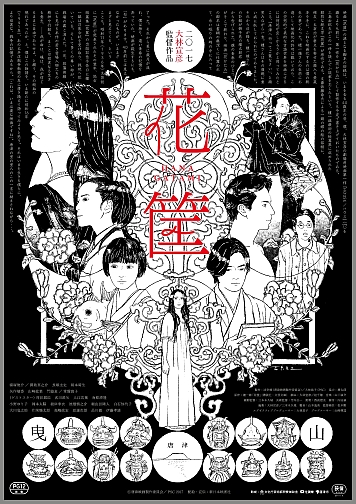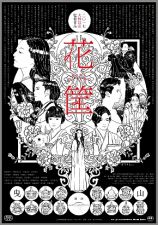Friday, December 01, 2017, 18:00 - 21:30
A master filmmaker completes his antiwar trilogy - and the culmination of a 40-year dream
Sneak Preview Screening: "Hanagatami" followed by a Q&A with
veteran director Nobuhiko Obayashi and producer Kyoko Obayashi
Friday, December 1 at 6:00 pm*

*Please note early start time.
In Japanese with English subtitles
Japan, 2017 169 minutes
Director: Nobuhiko Obayashi
Writers: Nobuhiko Obayashi, Chiho Katsura, inspired by the novel by Kazuo Dan
Producers: Kyoko Obayashi, Terumichi Yamazaki
Starring: Shunsuke Kubozuka, Shinnosuke Mitsushima, Keishi Nagatsuka,
Tokio Emoto, Honoka Yahagi, Hirona Yamazaki, Mugi Kadowaki, Takako Tokiwa,
Takehiro Murata, Tetsuya Takeda
Film courtesy of Espace Sarou
"A courageous man acts quietly" says one character in the extraordinary new film "Hanagatami," by Nobuhiko Obayashi, but the director himself does not bear out these words.
The legendary creator of "House," the 1977 comedy-horror extravaganza that brought him to global acclaim some 25 years after its release, Obayashi has been exceedingly prolific in the third act of his career. Not only has he received critical acclaim for recent work like "Casting Blossoms to the Sky" (2012) and "Seven Weeks" (2014) - which together form a trilogy with "Hanagatami" - but he has become increasingly vocal about the role of filmmakers as messengers of peace, believing that their work must convey the urgency of today's political situation.
Obayashi learned that he had stage-four lung cancer just before going into production on "Hanagatami," and was told he had only six months to live. Undergoing treatment while shooting in 40 locations with a huge cast, he seems to have been cured by the very process of self-expression. The resulting film fairly explodes with youthful vigor.
A visual, aural and philosophical feast, as are all the maestro's singular creations, "Hanagatami" (based on the novel by Naoki Prizewinner Kazuo Dan) features a large cast of up-and-coming actors in a Saga-set antiwar tale of epic proportions. In Obayashi's bucolic fever dream, the moon is always full, cherry blossoms bloom and fireflies flit, colors are eye-popping, poetry is on every lip, music ebbs and swells, mirrors crack, vampires suck lifeblood, ghosts return with messages, and metaphors are hard to parse.
In the spring of 1941, 17-year-old Toshihiko Sakakiyama (Kubozuka) returns from Amsterdam to Karatsu and starts living with his Aunt Keiko (Tokiwa). At school he meets a number of eccentric fellow students, including Ukai (Mitsushima), Kira (Nagatsuka) and Aso (Emoto). Each day, the teens test their courage by trying out a new adventure. Toshihiko falls in love with Mina (Honoka), who is suffering from tuberculosis, but doesn't mind the attentions of Akine (Yamazaki) and Chitose (Kadowaki). All too soon, these carefree youth will be sucked into the chaos of war, even as the boys, try to resist their destiny. The friends gather one last time to attend the Karatsu Okunchi festival, just outside the old castle...
Obayashi had wanted to film this story for 40 years, and it's no exaggeration to view it as the culmination of his many impulses and obsessions, his magnum opus. One of the characters even references Sadao Yamanaka's "Humanity and Paper Balloons," the last film the director made before being sent to Manchuria, where he died. "If war is worth fighting for," goes one line in Hanagatami, "so is a festival." And no one has ever put on a festival like Obayashi.
Join us for this sneak preview of the luminous masterwork "Hanagatami" ahead of its Japanese release on December 16.
For more (in Japanese): http://hanagatami-movie.jp
Director NOBUHIKO OBAYASHI was born in Onomichi, Hiroshima, destined to become a medical doctor like his father and grandfather before him. But he chose to focus on artistic pursuits, began making experimental films in college and won the Special Jury Prize for "Tabeta Hito aka The Person Who is Eaten" at the Belgium International Experimental Film Festival in 1963. He moved into the new field of TV commercials, creating memorable ads featuring well-known American stars like Kirk Douglas and Charles Bronson. He made his feature film debut with "House" (1977), employing a mixture of trick photography and avant-garde techniques to achieve its distinctive, surreal visuals. He broadened his mainstream appeal with the coming-of-age films "Chizuko's Younger Sister" (1991), "Exchange Students" (1982) and "The Little Girl Who Conquered Time" (1983), all of which featured his trademark visual flair. In recent years, he has received critical acclaim for "Casting Blossoms to the Sky" (2012) and "Seven Weeks" (2014). Among many other recognitions, Obayashi has received the Japan Literary Art Award Special Prize, the Medal with Purple Ribbon, and the Order of the Rising Sun. He has created over 2,000 works, and has just begun production on a brand-new film.
Please make your reservations at the FCCJ Reception Desk (3211-3161) or register below. You may attend the Q&A session without attending the screening, but you will not have seating priority. Please reserve in advance, still & TV cameras inclusive. All film screenings are private, noncommercial events primarily for FCCJ members and their guests.
- Karen Severns, Film Committee


